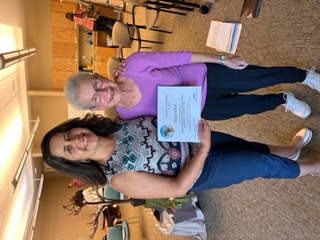When Marge Schell lost her husband Gary, 54, to lung cancer in 1998, she wasn’t sure what to do. She attended some grief support groups but didn’t find it helpful to repeatedly relive the stories of other attendees.
“I thought I was going crazy,” she said. “I couldn’t multitask. I would read the same book twice and then while reading it, I realized I had already read it. I had brain fog and had a tough time doing much of anything.”
Schell, 76, who holds a bachelor’s degree in medical technology and a master’s in administrative leadership with a focus in adult education, was at a loss. She started her career in medical technology and retired in 2015 from volunteer management at the Milwaukee Public Museum. She attended several grief groups — some church-related — and the pattern of retelling stories of loss continued.
“There was just no grief work to help get through the loss,” she said. “That is when I went to Wisconsin Memorial Park and Jacquelyn (Frances) Oliveira held an education program. She explained grief and gave us homework. The following week, we had to report on our progress and that was beneficial.”
When Schell’s sister died, she brought her nieces to Oliveira’s class so they could learn what she had and learn to cope with their loss.
“I was still working at the time and in the back of my mind, there were a lot of people grieving who didn’t know what to do. Time will heal and time also puts off healing. I knew they needed to do grief work,” said Schell, a parishioner at St. James, Franklin.
Two years after Schell’s husband died, she attended Marquette University’s School of Nursing program on grief. This was primarily to normalize her own grief, but after attending Oliveira’s program, she began attending her grief classes at the University of Wisconsin-Waukesha. In all, she has earned 132 continuing education credits in grief support.
“I attended every class she gave and took other people there to learn how grief affects people in this grief-avoidant society,” she said. “I even interned with Jacquelyn as I was working on UW-Madison’s grief support certificate in 2015.”
Schell speaks often, and presents classes and retreats on maneuvering through grief and loss, especially the loss of a spouse.
“The need is so great,” she said. “Through the years, I’ve developed six mantras for grievers that I use in my classes:
- I am the only person I can change;
- Different is not deficient;
- Comparison is the thief of joy;
- Forgiveness is key to accepting each unique, irreplaceable child of God;
- If it is mentionable, it is manageable (Fred Rogers); and
- Persistence over time leads to change.
It’s not time that heals, it’s what you do with your time that heals.”
Fred Hang, the Pastoral Associate at St. James, planned on starting a grief program, but his unexpected death left them broken-hearted and wondering if the program would materialize.
“Our new pastoral associate, Steve Fluur, stepped in and offered to host a program, but he was unfamiliar with how to go about it, other than what he learned in his certification program,” she said. “I offered to go with him to the Siena Center for an Honoring My Grief session. I am trying to help him as much as I can but at 76 and with my arthritis, I am not sure how long I am going to be around to help.”
Both Schell and Fluur earned their honoring grief certification last June.
“There is legal stuff that needs to be handled first after someone dies and it often takes a couple of years go get through the tasks before you can start working on healing. There is the burial and wondering what to do with belongings. It can be difficult to leave the house,” Schell said. “When you have trauma, you first have to deal with that before you can even grieve, I have found that journaling is the best tool for folks who need to be doing something. It is important to also find someone to listen to you without judging and giving advice. Babies and pets also help through the healing process as there is joy with babies and pets love unconditionally.”
To help others in dealing with grief and loss, Schell and Fluur are offering a monthly Hope in Mourning Grief support group for adults who have lost loved ones.
The initial meeting took place in September, but continues from 6:30 to 8 p.m. the second Wednesday of each month at St. James Parish, 7219 S. 27 St., Franklin. There is no charge, but register with Steve Fluur at 414-761-0480, ext. 113, or email sfluur@stjames-franklin.org. Parishioners and guests are welcome, regardless of faith background.

Marge Schell (right) has earned 132 credits of continuing education for grief support. (Submitted photo)
